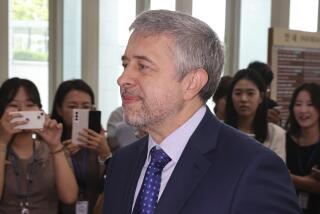Tighter U.N. sanctions target North Korean banking and cargo
The United Nations Security Council imposed a new round of sanctions on North Korea on Thursday in reaction to its defiant nuclear test last month, tightening financial restrictions on the isolated nation. The vote came after North Korea threatened to launch a nuclear attack that would “destroy the strongholds of the aggressors.”
The sanctions throw up new obstacles to North Korean banking and cargo shipments, freezing financial transactions that could help its nuclear efforts and mandating that countries deny North Korean vessels access to their ports if they refuse to be inspected. Countries must stop their banks from opening branches in North Korea if they could fuel its weapons programs.
The resolution also calls on countries to keep an eye on illicit activity by North Korean diplomats, and spells out more specifically what kinds of luxury goods are forbidden to Pyongyang.
“These sanctions will bite and bite hard,” U.S. Ambassador to the U.N. Susan Rice told reporters after the unanimous vote. “They increase North Korea’s isolation and raise the cost to North Korea’s leaders of defying the international community.”
Experts said perhaps the most striking thing about the new, tougher rules was that China, a longtime ally of North Korea, helped push forward the resolution. As the U.S. has turned its focus eastward through its strategic “pivot” to Asia, China may be worried that the belligerent talk and continued nuclear efforts from North Korea could prod Washington to beef up the military muscle of its allies in the region, analysts say.
“Beijing tried very hard to dissuade Pyongyang from carrying out this latest nuclear test and they failed,” said Suzanne DiMaggio, vice president of Global Policy Programs at the Asia Society. “These new sanctions are a clear sign that their impatience with North Korea is growing.”
The question now is how well Beijing enforces the stricter rules, DiMaggio said, since it has the most economic interplay with Pyongyang. “This may be the real test as to whether the Chinese are really taking a different approach,” she said.
[Updated, 10:51 a.m. March 7: The wording of the new sanctions still leaves wiggle room for countries to decide whether there are “reasonable grounds to believe” that financial transactions or other restricted moves will help the North Korean nuclear or missile programs, said Marcus Noland of the Peterson Institute for International Economics, who has written extensively on North Korea.
“The problem is, if a government isn’t really interested in implementing these sanctions, they could simply say there wasn’t enough evidence,” Noland said.
“If China wants to rigorously implement these restrictions, they can really disrupt their nuclear programs. If China doesn’t want to, it really doesn’t do much at all,” he added.]
Beyond enforcing the new sanctions, the bigger question is whether China will scale back its economic and energy support for North Korea, something that has long been within its power, said Daryl Kimball, executive director of the Arms Control Assn.
“If I were a betting person, I would bet that China is not going to change its policy in some sort of radical fashion,” Kimball said. “What China is worried about is that an extremely tough economic blockade of the north could lead to an economic collapse creating political instability, a refugee exodus and a crisis along its northern border. Because of that, China has been extremely reluctant to withhold support.”
Thursday’s resolution is the fourth such declaration from the U.N. Security Council since 2006, according to the Associated Press. In the days and hours leading up to the vote, North Korea lashed out against the U.S. in state media, threatening to hit the U.S. with a preemptive nuclear attack and tear up the armistice agreement that stopped the Korean War. It angrily denounced joint military drills by the U.S. and South Korea.
“The war maneuvers are timed to coincide with the moves to fabricate a new ‘resolution’.… It is a trite war method of the U.S. to cook up ‘a resolution’ at the UNSC to justify its war of aggression,” a foreign ministry spokesman said in a statement carried on North Korean state media.
“Now that the U.S. is set to light a fuse for a nuclear war, the revolutionary armed forces of the DPRK will exercise the right to a preemptive nuclear attack,” it stated.
Despite the latest North Korean nuclear test and its successful rocket launch last year -- a step that Western experts say doubled as a test of its ballistic missile technology -- the country is not yet believed capable of reaching the U.S. with a nuclear missile.
[Updated, 10:51 a.m. March 7: Kimball said while the new sanctions may slow or obstruct the continued development of the North Korean weapons program, they are not going to sway Pyongyang to change its behavior. The resolution also calls for the resumption of the six-party talks that North Korea abandoned nearly four years ago.
U.S. Special Representative for North Korea Policy Glyn Davies told a Senate committee Thursday that the “end game” -- the peaceful denuclearization of the Korean peninsula -- would require dialogue, and that close consultations with China would be key to finding “genuine diplomatic openings.”
“But let me state the obvious: North Korea’s reckless provocations have certainly raised the bar for a return to dialogue,” Davies said.]
ALSO:
Bid to ban commercial trade in polar bears fails
Chavez’s spirit will guide Venezuela - until leftist unity frays
Dancer denies ordering use of acid in attack on Bolshoi director
More to Read
Sign up for Essential California
The most important California stories and recommendations in your inbox every morning.
You may occasionally receive promotional content from the Los Angeles Times.










